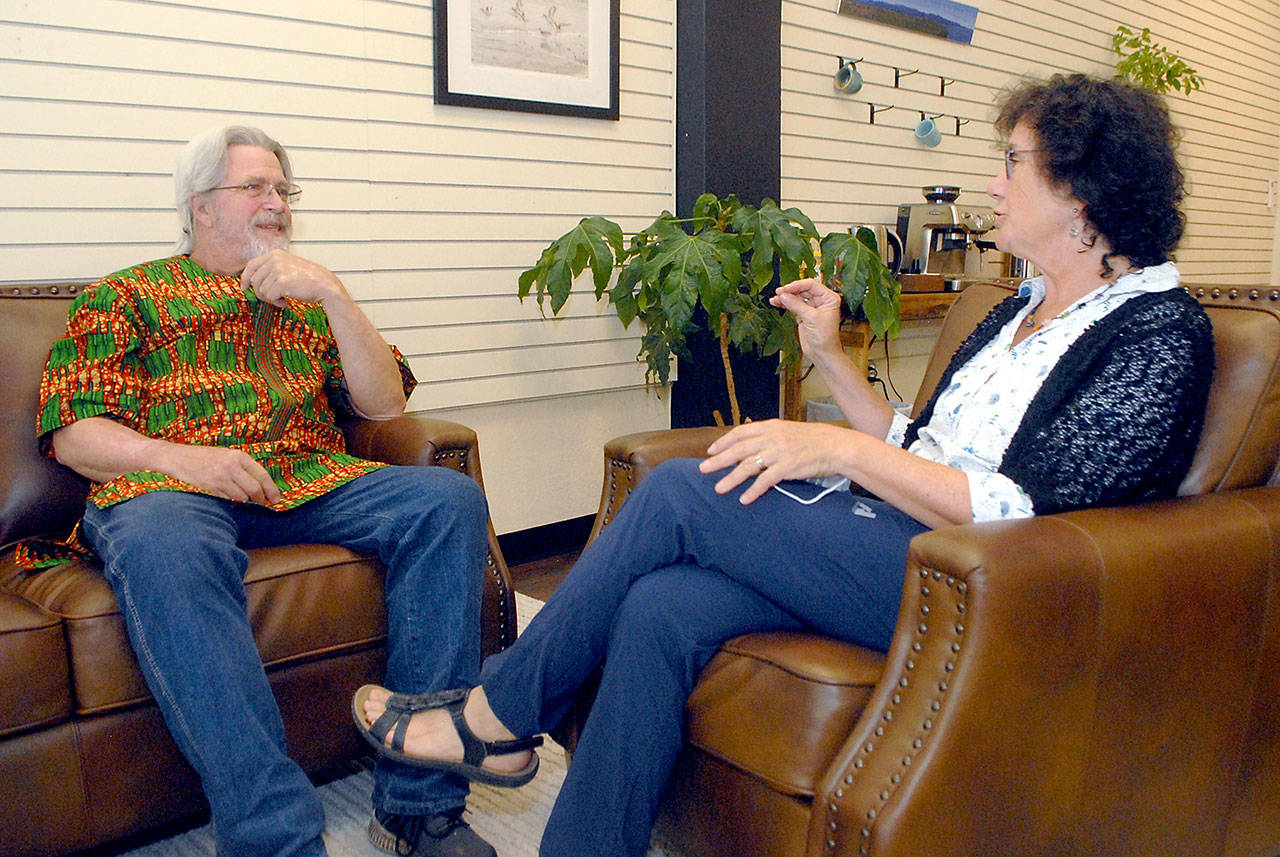PORT ANGELES — Waste won’t go to waste in an offshoot of a project to make a human necessity safer for the people of Togo in West Africa.
Doc Reiss, who coordinated efforts to build sturdy compost toilets for families living in the villages of Togo, is leaving Port Angeles later this month for Ghana to focus on creating a nonprofit business that converts human urine into organic fertilizer. Once he arrives in Ghana’s capital city of Accra on Aug. 26, he plans remain in Africa for at least five years.
About five years ago, he and Bedi Taouvik Boukari began the Dignity Toilets for Togo program in Boukari’s village. The idea was developed through their friendship via an international pen pal club after Boukari told Reiss that people were forced to walk out into surrounding bushes to relieve themselves; as they sought privacy, some women were raped and children were at risk, especially at night.
“Each (family) toilet has taken six to 10 people out of the bushes,” Reiss has said.
In the beginning, the $400-per-toilet cost was borne by Reiss. Soon, donations came in from Nor’Western Rotary — of which Reiss is a member — as well as Rotary Clubs across the North Olympic Peninsula and other sources.
Now, after 110 families have each received their own composting toilet, a new opportunity is in development.
“I don’t have 110 toilets. I have 110 fertilizing stations — and people who don’t mind if we come out and empty” the collection buckets of urine, Reiss said Friday, describing how solid and liquid wastes are stored separately in the composting toilets.
An entrepreneur in Malawi, Goodfellow Phiri, is distilling human urine into an odorless, organic fertilizer through the simple method of sealing it in 55-gallon drums and letting it sit for a couple of weeks, Reiss said.
The borders of the southeastern African nation are now closed, but once they reopen, Phiri has agreed to teach Reiss and Boukari how to do it, and is now providing technical assistance long-distance.
The nitrogen-rich liquid fertilizer, once it is diluted with water, can be sold to farmers who grow a wide range of crops — casaba, yams, corn, beans, tomatoes, okra — for cheaper than chemical alternatives, Reiss said.
At the same time, the fertilizer is “better for the earth than any chemical you can buy and does the same thing,” Reiss said.
Once the business is on its feet, the money will return to the villages that provided the raw material. Fertilizer sales will pay school fees for children — fees are charged for every grade — or other expenses so the villages can devote resources to other endeavors.
“The result is that the profits come back to the communities,” said Kathi Pressley, who is taking over as the U.S. contact for the Dignity Toilets for Togo project while Reiss and Boukari concentrate on building the fertilizer business.
Pressley, the grant coordinator for Nor’Western Rotary, had commented to Reiss that although he started the project primarily to benefit women and children, he had no women involved in the effort.
That has changed. Two women now will oversee the composting toilets project. Pressley is stepping into the role of Dignity Toilets for Togo project coordinator along with her counterpart, Niki Takpatou of Zogbedgi, Togo, who will take over for Boukari.
Peninsula Rotary Clubs in Port Angeles to Sequim and East Jefferson counties are raising funds for the project, according to Reiss, while Pressley continues to work for a Rotary International grant. Donations are welcome from anyone, he added.
“We can always use more funding,” he said.
Reiss said he is settling into an apartment in Ghana because that nation will give him a longer-term visa than neighboring Togo. He will travel as needed.
As the fertilizer business is developing, Reiss will stay busy using his Realtor skills to teach people how to be real estate agents, he said.
Ghana has a Multiple Listing Service that is endorsed by the National Association of Realtors, which is a global organization, and so Reiss’ license acquired in the United States is recognized there.
English is spoken in both counties, although French is more common in Togo, Reiss said, adding that while his French is poor, Boukari’s self-taught English is excellent.
Pressley said she and Takpatou communicate in a mixture of English and French, often relying on computer translations.
Reiss is vaccinated against COVID-19 and Boukari has had his first dose. Residents of both counties are using face masks and social distancing, Reiss said, also noting that in Togo, there is one doctor for every 20,000 people.
Everything is falling into place, he said. He’s looking forward to the challenge.
“No matter where you are, you have what you need to be successful if you can recognize what you’re looking at,” Reiss said, citing Russell Conwell’s “Acres of Diamonds.”
It’ll be an adventure.
Stay tuned for the blog.
________
Executive Editor Leah Leach can be reached at 360-417-3530 or at lleach@peninsuladailynews.com.

